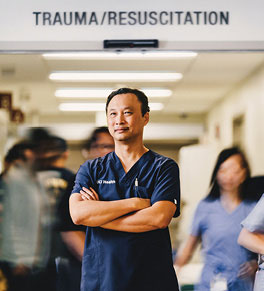Surviving on the frontlines of COVID-19

Thien (Tim) Do brings a unique perspective to his work as an emergency department (ED) nurse at UCI Medical Center.
He’d earned a college degree in computer engineering but became a licensed vocational nurse after the internet bubble burst in 2000. The married father of three then earned an RN degree and joined UCI Health in 2013.
When news of a mysterious virus later named COVID-19 began to circulate in early 2020, Do paid close attention.He and his ED colleagues began to educate themselves and prepare as best they could. Then in late April 2020, he fell gravely ill.
Do survived but today he worries that society is taking the disease and its lessons too lightly. Here he recounts his harrowing struggle with the infectious disease for Live Well.
The onslaught begins
When the first COVID-19 cases began to appear in our ED, we were all on pins and needles. We knew the onslaught was going to come, but we didn’t know how to prepare or to prevent getting it.
In late April, I developed flu symptoms. It got to the point where I couldn’t get out of bed. I couldn’t walk 10 feet without having to hold onto something. My pulse oxygen level dropped to 82. Anything 80 or below, you need to get to the ED.
By that time, I’d been sick for about a month. We didn’t have any treatment that worked yet. I’d been following COVID-19 statistics closely. With my symptoms and low pulse oxygen rate, I knew if I went to the ED I would be automatically intubated. I’d read that only 10% of the people in New York City who were intubated made it through. I decided to take my chances.
Feeling close to death
I told my wife, ‘If I’m going to die, I’d rather it be in my own bed.’ Was that ever scary! I could barely breathe.
One night, I called my family in. I told them if I didn’t last the night, I wanted to say how much I love them. I told my wife to keep an eye on the pulse oxygen level; if it went below 80, to call the paramedics. My kids were 17, 12 and 10 at the time.
I don’t think they realized how close to death I was. I told myself, it’s in God’s hands now. He let me survive.
A very slow recovery
But it took almost four months to get to the point where I could function. It took me a year to get my breathing back.
It wasn’t just me who got sick at work. We were dropping like flies. We had lots of traveling nurses filling in. It’s definitely hard work. But in the ED, we basically just soldier on.
My wife got sick too. I don’t know that people realize healthcare workers put their lives on the line. I’m not saying we’re heroes or anything, but you put yourself and your whole family at risk.
Still here for a reason
Yes, working in the ED is a hazard. That’s why he advises nurses in training to take all precautions to protect themselves and their family — and to get every vaccine available. He knows the pandemic has led nurses to leave the profession in droves, but he still loves the job.
Nursing is a calling. I think God put me here for a reason: to take care of people. I could certainly move on and do something else, but I still love being in the ED, helping to get people stabilized.




